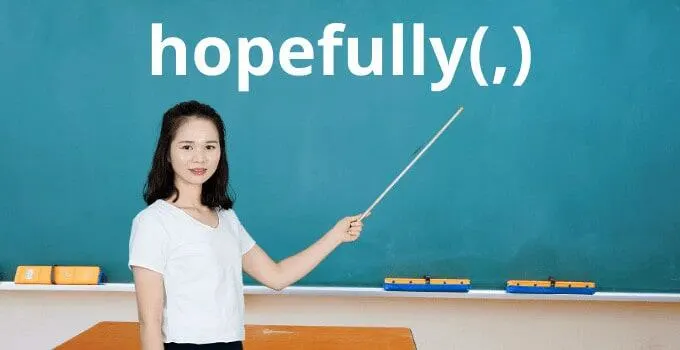Understanding how and when to use the comma in English can be confusing.
One reason is because there is not always a strict rule about when to use a comma.
Both native and foreign speakers of English struggle with comma usage.
While there are times when you definitely need a comma and times when you definitely do not, some comma usage is a matter of style and not grammar.
Different industries or publications have their own rules about when to use these optional commas.
Do you need a comma after “hopefully”?
“Hopefully” needs to be followed by a comma when it comes at the beginning of a sentence as an adverb or a sentence adverb.
It does not need to be followed by a comma if it starts a sentence as part of a fronted adverbial, and it rarely needs to be followed by a comma if it is used as an adverb anywhere else in the sentence.
The exception is if it is used in some way that requires a comma of any type of word, such as part of a list of three or more things.
“Hopefully”: Regular adverb or sentence adverb?
There are two ways to use “hopefully.”
”Hopefully” as an adverb
The first way is to describe someone performing an action in a hopeful way.
In this definition, “hopefully” is an adverb, meaning that it modifies a verb, or gives you additional information about an action that is performed.
Here is an example:
She smiled hopefully at her teacher.
As you can see, you do not need a comma when “hopefully” is used in this way.
There is one way in which “hopefully” needs a comma when used an adverb in the middle of a sentence.
You may already know that you need to use a comma to separate three or more words in a list. For example:
He chose the colors red, blue, and green.
(Note that in a list like this one, the final comma after the second to last item in the list, before “and,” is optional!)
It would be uncommon to string together a series of adverbs in this way, but you might do it for a slightly humorous effect.
He ran toward the pile of money hopefully, quickly, and desperately.
“Hopefully” as a sentence adverb
The second way hopefully is used is to mean “I hope.” In this definition, “hopefully” is known as a sentence adverb.
While regular adverbs just modify one verb, a sentence adverb modifies the sentence or phrase that follows it. For example, you might say:
Hopefully, I did well on that test.
While “hopefully” used in this way most commonly comes at the beginning of a sentence, it might appear between the subject and the verb as well. You do not need to follow it with a comma if this is the case:
I hopefully did well on that test.
This second meaning is a newer one.
In fact, some people who are very fussy about language might tell you that “hopefully” used in this way is incorrect although very few people think this any longer.
The fact is that this is how the English language evolves.
There is not an official body or regulator that determines whether a word can be part of the English language.
Almost everyone uses “hopefully” in both of the above ways in English now, so most dictionaries consider it a standard part of the English language.
Most people now would probably be unaware that there could be anything controversial about “hopefully” used in this way.
More on starting a sentence with “hopefully”
Usually, when you see “hopefully” at the beginning of a sentence, it is a sentence adverb. However, it can also be used as an adverb.
Find the context of “hopefully” at the start of a sentence
You can usually tell from context whether “hopefully” is being used to mean “I hope” or to describe doing a thing in a hopeful way:
As soon as class was over, Janet ran to the auditorium. Hopefully, she scanned the list of people chosen for the school play.
While this could mean “I hope she looked at the list” or “She looked at the list in a hopeful way,” it seems obvious from context that it has the second meaning, as an adverb.
It needs to be followed by a comma.
When “hopefully” begins a sentence and a comma is not needed
Here’s an example of a sentence starting with “hopefully” when it is not followed by a comma:
As soon as class was over, Janet ran to the auditorium. Hopefully scanning the list, she was delighted to see her name on it.
In this example, the word “hopefully” is part of a fronted adverbial, meaning a phrase at the beginning of a sentence that modifies the rest of the sentence.
It may help to notice that a fronted adverbial acts just like a sentence adverb but it just has more words in it.
Just like a comma follows “hopefully” when it is used as a sentence adverb, a comma follows the full fronted adverbial that begins with “hopefully”—and not the word “hopefully” itself.

Hey fellow Linguaholics! It’s me, Marcel. I am the proud owner of linguaholic.com. Languages have always been my passion and I have studied Linguistics, Computational Linguistics and Sinology at the University of Zurich. It is my utmost pleasure to share with all of you guys what I know about languages and linguistics in general.

